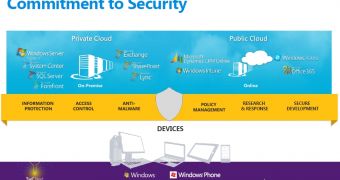Small and medium businesses have a lot to gain through adopting cloud computing, a recent research from comScore - sponsored by Microsoft - shows.
Not only would these companies benefit from important time and money savings when adopting the cloud, but they also see increased security levels, the aforementioned research shows.
According to the survey, which was conducted among both cloud and non-cloud SMBs in the U.S., India, Hong Kong, Malaysia and Singapore, most businesses who chose to make the move to the cloud consider it a great step in their evolution.
The study shows that SMBs are increasingly more confident on the benefits of cloud computing after adoption, and that twenty percent of companies spend less on security, while only 4 percent of non-cloud businesses suggest the same
Forty-one percent of cloud users considered the service provider as being entirely responsible for the security of their information, which suggests both the level of confidence in such services and that they need to be educated on their responsibilities on the area.
Fifty-seven percent of surveyed companies said that they felt that responsibility was shared with their cloud provider.
This also means that companies that offer cloud services have to ensure that their software is constantly updated so that they can meet the latest requirements in terms of security and reliability.
Richard Saunders, director, Trustworthy Computing, explained to Softpedia in a phone briefing that Microsoft is focused on improving the security of their cloud products.
Every second Tuesday, the Redmond-based giant releases security updates to users, in a process that also makes security updates delivery more predictable and transparent.
Microsoft is one of the main players in the provision of cloud services, with an offering that includes products such as Windows Azure, Windows Intune, Office 365 or Dynamics CRM, available for all customers interested in benefiting from public cloud capabilities.
Moreover, the software giant offers private cloud products as well, including Windows Server, SQL Server, Microsoft Exchange, Lync, SharePoint and the like, all of which are being periodically updated with patches for discovered vulnerabilities and with new features.
Of course, this does not mean that all targeted companies install these updates, due to a variety of reasons, including the costs and the lack of expertise to adjust the business to these updates.
Other findings of the survey also include:
- Forty-five percent said it was easier to integrate systems. - Thirty-eight percent said they spent less time managing security. - Thirty-four percent were more confident in their company’s regulatory compliance. - Forty-two percent said the cloud made it easier for them to scale their business to explore new markets. Forty-one percent said they were able to employ more staff in roles that directly benefit sales or growth. - Thirty-nine percent said they were able to invest in product development or innovation. - Thirty-seven percent felt that they benefitted from improved agility and competitiveness. Under Impacts, improved security and agility/competitiveness and better scalability are benefits perceived by cloud users.
All in all, it seems that cloud computing is indeed helping SMBs become more competitive and enjoy important savings and increased security levels.
However, not all of them consider the cloud as reliable. Those who haven’t adopted it yet are worried of transparency and identity security say that industry standards for cloud security would help them reconsider their position on the matter.
Non-cloud users are also concerned about security (40 percent) and the cost of transitioning (33 percent) to a new business model, yet the research shows that, in fact, they have nothing to fear on this.
However, Richard Saunders also notes that businesses need to make their own decision when it comes to cloud computing, but that they also need to make informed decisions, and that Microsoft is one of the companies focused on ensuring that this indeed happens.

 14 DAY TRIAL //
14 DAY TRIAL //